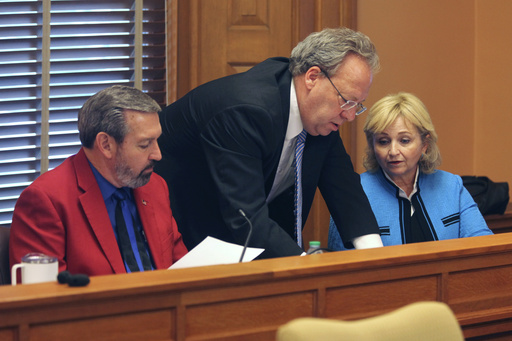TOPEKA, Kan. (AP) — Kansas lawmakers approved a new, slightly smaller package of tax cuts before adjourning their annual session early Wednesday, expecting Gov. Laura Kelly to veto it and call a special legislative session to push for a plan more to her liking.
The Democratic governor and Republican-controlled Legislature agree on a good deal of policy that would save taxpayers a total of between $1.42 billion and $1.92 billion over the next three years on their income, sales and property taxes. Their remaining differences are over how the state’s personal income tax is structured and whether the state can avoid future budget shortfalls if the tax cuts are worth much more than $430 million a year as of 2029.
The impasse over cutting taxes, particularly income taxes, has continued over the past 18 months. Kansas has been unable to enact major tax cuts even though its coffers are bulging with surplus revenues.
“Insanity is doing the same thing over and over and expecting a different result,” Senate Minority Leader Dinah Sykes, a Lenexa Democrat, said just before senators adjourned for the year, quoting scientist Albert Einstein. “I will see you all in a couple of weeks.”
Republican leaders spent Tuesday afternoon and evening revising one last tax bill after they couldn’t muster the two-thirds majority necessary in the Senate on Monday to override Kelly’s veto of a bill approved earlier this month that would cut taxes by $1.56 billion over the next three years. They needed 27 of 40 votes and were one short, thanks to what has become a solid bloc of the Senate’s 11 Democrats and three GOP dissidents.
The governor’s stance has increasingly exasperated some fellow Democrats in the House, most of whom supported both the last bill she vetoed and the one headed to her desk. The latest version of the big tax bill, one of four measures cutting taxes, would save taxpayers $1.46 billion over three years.
Republican leaders said their differences with the governor amount to only a few million dollars in cuts a year.
“If we can’t get a signature on this, I’m not sure what she will sign,” House Taxation Committee Chair Adam Smith, a Weskan Republican, told fellow Republicans during a meeting before the House approved the big tax bill.
The votes on the bill were 108-11 in the House and 25-9 in the Senate. While five senators were absent and one passed, there’s still no sense that GOP leaders can muster a two-thirds majority.
Kelly and top Republicans have agreed on eliminating state income taxes on retirees’ Social Security benefits, which kick in when they earn $75,000 a year. They also agree on reducing a state property tax for schools and eliminating the state’s already set-to-expire 2% sales tax on groceries six months early, on July 1.
But top Republicans began the year hoping to move Kansas from its current three personal income tax rates to a single rate. They view that as simpler and fairer, though Kelly told them in vetoing their first plan this year in January that the move would benefit the “super wealthy.”
The plan Kelly vetoed earlier this month and the one approved late Tuesday night would move Kansas to two personal income tax rates. The highest rate, now 5.7%, would have been 5.55% under the bill Kelly vetoed and would be 5.57% under the one going to her desk.
Kelly told House Democrats earlier this month that she sees going to two personal income tax rates as a step toward the single-rate “flat” tax that she opposes.
But she has focused far more of her criticism in recent weeks on predicting that GOP proposals would lead to budget shortfalls in five or six years. She contends they would eat away too quickly at the $4.3 billion in surplus funds the state expects to have on hand at the end of June — equal to 41% of the state’s annual general tax revenues.
“The governor has moved the goalposts on us many, many times,” House Speaker Dan Hawkins, a Wichita Republican, said during the caucus before the House vote on the last big tax bill. “Quite frankly, it’s on her. What we have right now is as close to what she wants as we can give her.”
Kelly has argued that tax cuts should cost no more than $433 million during the state’s 2029 budget year. The latest version of the big tax bill came in at $439 million, compared with the $469 million for the last bill Kelly vetoed.
Legislators ended their annual session the same day the Kansas Department of Revenue reported that the state’s tax collections in April exceed expectations by nearly $102 million, or almost 8%.
“What we’re arguing over is almost silly,” Senate President Ty Masterson, an Andover Republican, said during a post-adjournment news conference with other GOP leaders. “In the scope of the Kansas budget, it is a fraction of a percent apart, and we’re supposed to believe that one is sustainable and one is devastating.”
But Kelly and her staff argue that Republicans’ math is faulty because their figures don’t include other tax bills.
Kelly’s top figure of $433 million a year for 2029 includes one of them, and when that one is added to the latest bill, its 2029 cost is $487 million, a gap of $54 million between it and Kelly’s top number.
“They just want to pretend that those bills don’t count towards this,” her chief of staff, Will Lawrence, told reporters Tuesday evening. “She’s the only one who’s been responsible in that scenario.”
But some lawmakers have grown weary of the back and forth. With elections for all legislative seats looming this year, they just want to confirm for their constituents that big tax cuts are coming.
“I’d much rather have a plan that she would sign than all this theater,” said Rep. Ken Rahjes, an Agra Republican.



